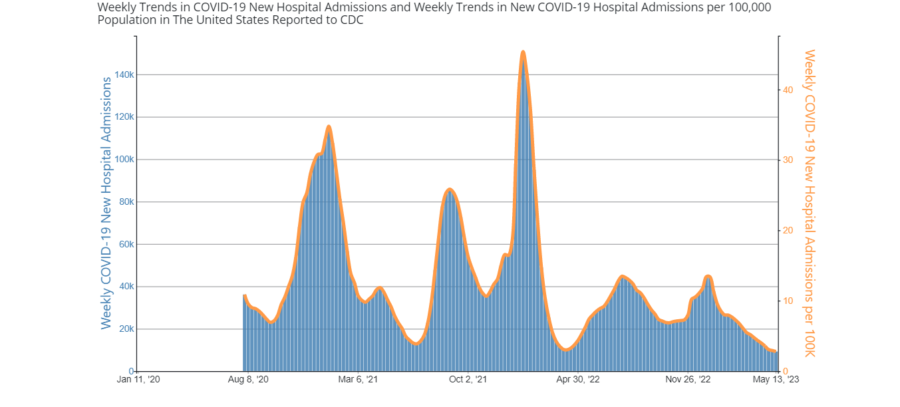The Conclusion of COVID (?)
The COVID-19 public health emergency has expired. So now what?
On January 31, 2020 the Department of Health and Human services declared that COVID-19 presented a public health emergency. Since then, the declaration has been renewed 13 times. But on May 5, the CDC officially announced that the COVID-19 Public Health Emergency declaration would expire. Due to this, it has not been uncommon to hear talk in the hallways that “Covid is over.” While this is a nice sentiment, it is not an entirely accurate one. There may no longer be a public health emergency, but the effects of the three-year global pandemic will be as continuous as they are longstanding.
First of all, what is staying the same? According to the official announcement from the CDC, vaccines and medication for severe COVID-19 will remain available for free. Through April of 2024, hospitals will be required to report all positive COVID-19 cases as well. However, they will now be reported weekly instead of daily.
Many of the changes deal with the methods of data collection and reporting. The CDC will be reporting COVID-19 test positivity rates through the National Respiratory and Enteric Virus Surveillance System (NREVSS). This is because with the ending of the (PHE) Public Health Emergency, the CDC’s authority to collect and receive certain types of data ended as well. Also testing is no longer required to be covered by insurance.
As for the reasoning behind ending the PHE, the CDC stated, “As a nation, we now find ourselves at a different point in the pandemic – with more tools and resources than ever before to better protect ourselves and our communities.”
This is true, the nation is at a different point with COVID-19. But the ending of the public health emergency does not necessarily mean that it is the end of everything that has happened over the last three years. For example, acts of racism and harassment towards AAPI individuals didn’t simply disappear on May 11. The Center For the Study of Hate and Extremism reported that anti-Asian hate crimes surged to 339% between 2020 and 2021. These numbers appeared to go down back in November of 2022 but after a change in the way the FBI collected data surrounding hate crimes, it was found that they are still at an all-time high.
Along with this, immunocompromised people are still especially vulnerable to COVID-19, thus the emergency has not ended for them. If feeling unwell, it is still recommended to stay home for at least five days and make sure to quarantine and isolate until testing negative for the safety of others. According to the CDC, “These recommendations do not change based on COVID-19 hospital admission levels,” and it can be assumed that these recommendations will continue beyond the end of the PHE.
Finally, COVID-19 is still a dangerous disease overall, including for people who are not immunocompromised. Along with this, a considerable amount of people who get COVID experience what has been referred to as “Long-Covid” or “Post-Covid effects.” According to the CDC, one in thirteen adults experienced post-covid symptoms lasting several months.
Even though COVID-19 is no longer considered a public health emergency it is still important to act with caution and compassion.
Avalon is a passionate 18 year-old senior and has been writing for the Messenger since January of 2021. When not at school or volleyball practice, you...





